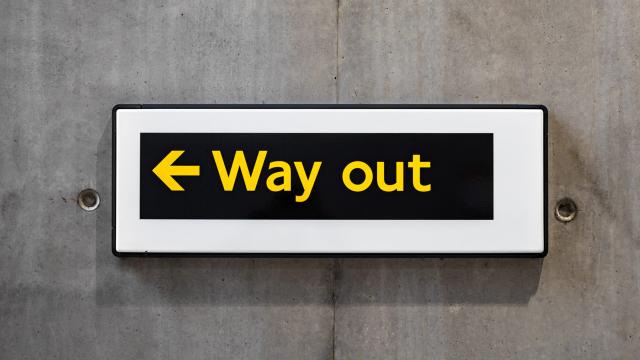There’s no need to make a big deal about leaving every gathering you attend. Just leave — it’s fine.
What is an Irish Goodbye?
The “Irish goodbye” or “French exit” — not be confused with “ghosting” — is the act of leaving an event without actually telling everyone that you’re leaving. You just go. Sound rude? It isn’t.
To understand the Irish goodbye, you have to understand why it came to be. As Cahir O’Doherty explains at Irish Central, Irish goodbyes are simply the opposite of “Irish welcomes”. You see, the Irish are famous for being extremely hospitable. So hospitable, in fact, it can be a bit overwhelming. You’re offered something to drink, something to eat, and constantly being taken care of. This kind of hospitality translates to an extremely long farewell, like this example:
Are you leaving us? Ah, you’re leaving us. Would you like a cup of tea? Would you like a biscuit? There are leftovers. I have Tupperware and tinfoil, sure we’ll put it in that. It’s no trouble. And a custard cream. We’ll put it in the bag, sure. No, we’ll put it in your pocket. Say nothing. And take this and this and this and this and this and this and this. And let me hold your coat. Is this your coat? Is this — or this — or this — or this — or this — or this your coat? Look-it, it’s raining. Stay until it stops raining. I am not letting you go and it’s raining…
So, when you think about it, Irish goodbyes aren’t rude — they’re actually pretty considerate. You’re sparing your host the trouble of giving you a long farewell, you’re not interrupting people’s conversations with an egotistical “Goodbye everyone! Stop what you’re doing and look at me!”, and you avoid wasting anyone’s time making plans you’ll never follow through with. Besides, nobody cares if you leave. The party will go on without you.
How to do an Irish Goodbye properly
While Irish goodbyes aren’t inherently rude, you still have to do them right. Some scenarios aren’t meant for the Irish goodbye, for example. They’re best used for exiting parties, and perhaps some work events, but probably not when you’re visiting grandma or having an intimate dinner with friends. Here’s how to do it:
- Plan ahead, if you can: If you know you’ll be pulling an Irish goodbye, think about your exit strategy. Don’t bring anything you’ll need to retrieve before you leave, like coats, plates, games and so on. And make sure you pay your tab first. Don’t stick anyone else with the bill.
- Pick an exit: When you’re ready to go, look for a route that’s out of the way and won’t draw attention.
- Let someone know: You don’t have to completely disappear for this to work. It’s OK to tell a close friend you’re taking off so no one starts to worry about you. A text works too.
- Ninja vanish: Disappear into the night and make your way home (or wherever it is you’re headed).
If that all still feels too impolite for your tastes, you can always send a thank you email or text the next day. Or make your exit, then send a text once you’ve gone. They will understand, trust me. And if someone sends you a “where are you?” text, be nice and respond. And that’s it! The Irish goodbye is easy as pie. Now, if you’ll excuse me…

Comments
One response to “In Praise Of The Irish Goodbye”
Any mention of thanking your hosts?
“The party will go on without you.”
Exactly how Christopher Hitchens described death!